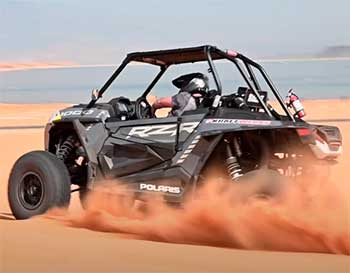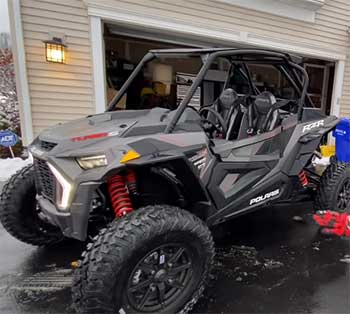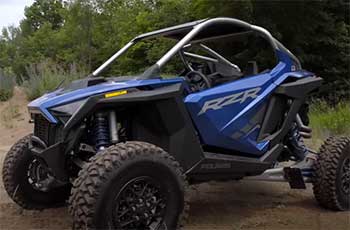Terrain-dominating vehicles like RZR 1000 need a good power boost to unlock their best performance. Custom systems like superchargers and turbo can do that.
The supercharger gives more hp, is less fuel efficient, and is harder to set up. Turbo gives less hp but is fuel efficient and more convenient.
RZR 1000 is a powerful vehicle, but even it needs an extra power nudge. Supercharger and turbo- both systems can do that, but which one should you pick?
Here is a comparison to help you decide.
A Quick Summary of the Comparison
| Feature | RZR 1000 Supercharger | RZR Turbo |
| Power and performance | Adds more hp, instant power | Adds less hp, has turbo lag |
| Fuel efficiency and durability | Burns fuel faster, less durable | Doesn’t burn fuel extra fast, more durable |
| Ease of installation | Harder to set up | Easier to set up |
Key Differences Between Supercharger And Turbo
The major difference between superchargers and turbo are their power and performance, fuel efficiency and durability, and ease of installation.
Let’s see how these work out in both boost systems.
- Power And Performance

The supercharger and turbo both add a similar level of power boost, but there’s a small difference.
Supercharger adds a little more HP and the power boost is instant.
Turbo isn’t very far behind, but it does add less HP than a supercharger.
And then there’s the issue of turbo lag.
The stock RZR XP 1000 can give you around 125HP on a good day.
But this isn’t always enough, plus the speed on stock engines is low for most people.
The whole point of adding a booster is to help with HP and speed, and a supercharger does exactly that.
A supercharger can get an HP output of around 170 depending on your vehicle model and what fuel you’re using. The power flow starts the moment you start your engine so you won’t have to worry about lags.
Turbo on the other hand is pretty close to boosting HP but falls slightly behind. You won’t realize the slight gap in power output unless you use both.
The biggest issue of turbo boosts is the lag. Because of how the system works, the power flow takes a little time to get going. No biggie, but some people don’t appreciate the lag.
Also Read: Differences Between Polaris And Honda ATV.
- Fuel Efficiency And Durability
Supercharger systems are notorious for their fuel-draining issues. Since the power flow starts immediately, the engine has to burn extra fuel to keep it going right off the bat.
This goes on as long as the engine is running. So your engine fuel will get drained faster compared to a stock engine or even turbo.

Another issue with the supercharger boost is its durability.
The belt wears off really fast, you might need to change the belt every 100 miles or so.
And besides that, the belt is on the stator side of the engine so it is more vulnerable to outside effects.
One pebble in the wrong place and you end up with a dead system.
Turbo boost system doesn’t have to get going right off the bat so your engine doesn’t have to burn extra fuel to get it going.
Turbo doesn’t have this problem. Ironically, the turbo lag that people hate is the reason why it is more fuel efficient. This means you get a power boost and you don’t have to sacrifice your fuel budget cap for it.
Turbo is also more durable. Unlike the supercharger, the turbo’s build isn’t reliant on the belt drive system. You won’t have to worry about changing belts or pebbles getting stuck in said belt.
- Ease of Installation
This is the reason a lot of people stick with turbo. The supercharger is more complicated to install.
Fortunately, you can find lots of tutorials on the internet for guidance. But it will still take up the better part of your day.
Compared to Supercharger, a turbo is much easier to set up. It has a bolt-on system and there are lots of tutorials for it too.
You can wrap up installation in almost half the time compared to the supercharger.
Which One Should You Go With?
Both engine systems are good in their own way. They have their own pros and cons and aren’t always comparable head-to-head. So picking one is pretty hard.
If more horsepower is your focus and you’re okay with splurging, the supercharger is a good choice.
The supercharger gives you a bigger power boost compared to the turbo and there is no lag in flow either. Installation is a little hard but you can find plenty of tutorials to help you out.

The problem with a supercharger is that it isn’t very fuel efficient. Plus the belt wears off pretty fast too.
If you’re focusing more on durability or want an affordable option, turbo is your best bet.
The power boost is lower than the supercharger but everything else is top-notch.
Turbo is more durable, is easier to set up, and won’t eat up your fuel tank in a blink.
The only notable problem with the turbo is the lag in power flow. If you don’t have an issue with that, turbo is tough to beat.
Overall, turbo is the better choice here. But if want a big power boost and don’t mind spending a bit extra, the supercharger is a very good option too.
Also Read: Comparing Gladiator Overland With Mojave.
Frequently Asked Questions (FAQ)
An RZR 1000 with a stock engine can get you up to 115 HP. If you add a supercharger, the number can jump to 165. If you add a turbo, the number can go up to 160+ as well. But the power output will depend on other factors too.
The top speed limit on a Polaris RZR 1000 turbo is 85 mp/h, but you can go up to 87 mp/h if you tweak around a little with tailwind and downward incline. Some models can go around 90 mp/h but that’s considered more of an exception.
A supercharger can add 50-100 horsepower depending on the vehicle model and fuel.
Polaris 1000 turbo can give you 160+ HP.
Final Verdict
When it comes to power-boosting, both superchargers, and turbo are amazing (hence the whole debate!). In the end, what you choose depends on your preference. Objectively, turbo is the better choice.
But if you’re looking for a better power boost and not durability, the supercharger is the better choice.

